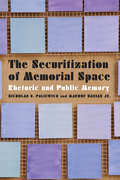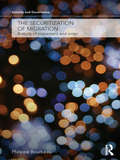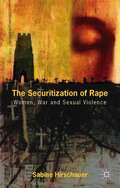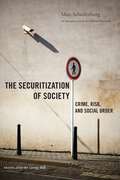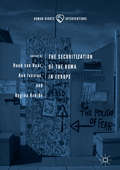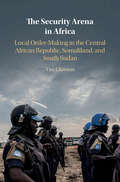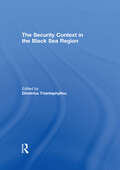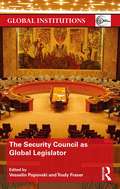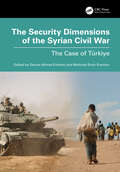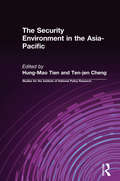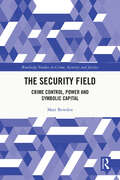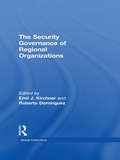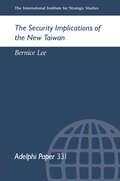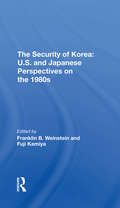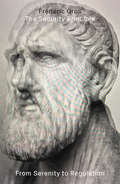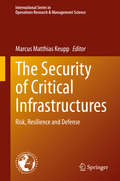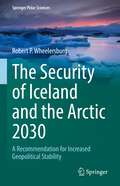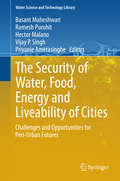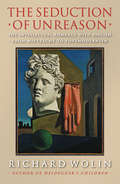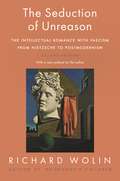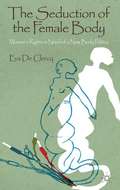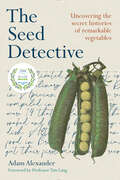- Table View
- List View
The Securitization of Memorial Space: Rhetoric and Public Memory
by Nicholas S. Paliewicz Marouf Hasian Jr.The Securitization of Memorial Space argues that the National September 11 Memorial and Memorial Museum is a securitized site of memory—what Foucault called a dispositif—that polices visitors and publics to remember trauma, darkness, and victimage in ways that perpetuate the “necessity” of the Global War on Terrorism. Contributing to studies in public memory, rhetoric and argumentation, and critical security studies, Nicholas S. Paliewicz and Marouf Hasian Jr. show how various human and nonhuman actors participated in complicated argumentative formations that have mobilized political, performative, and militaristic practices of anti-terroristic violence in other parts of the world. While there were times that certain argumentative stakeholders—such as local New Yorkers—questioned the necessity of securitizing this site of memory, agentic factions including the families of those who died on 9/11, public supporters, security agents, and politicians created an ideologically oriented security assemblage that remembers 9/11 through counter-terroristic performances at Ground Zero. In chronological order from the 2001 “dustbowl” to the present popularization of 9/11 memories, the authors present seven chapters of rich rhetorical analysis that show how the National September 11 Memorial and Memorial Museum perpetuates grief, uncertainty, and angst that affects public memory in multidirectional ways.
The Securitization of Migration: A Study of Movement and Order (Security and Governance)
by Philippe BourbeauThe international movement of people is provoking worldwide anxiety and apprehension. Nation-states around the globe, especially Western ones, are cracking down on migration for security reasons. International migration has become a key security issue and is perceived, by some, as an existential security threat. The Securitization of Migration is about the movement of people and the system of order underpinning the movement. In undertaking a comparative study of Canada and France, the study analyzes the process of securitizing migration. It explores the process of discursively and institutionally integrating international migration into security frameworks that emphasize policing and defence. Drawing upon social theory, migration studies, and Securitization Theory, Philippe Bourbeau seeks to understand the concepts of power underlying security frameworks and how these affect the treatment of migrants and immigrants. This book is one of the first to systematically and comparatively examine the role of political agents, media agents, and contextual factors in the process of securitizing migration. The book will be of interest to students and scholars concerned with comparative and theoretical approaches to security and migration studies.
The Securitization of Rape
by Sabine HirschauerThis book uniquely applies securitization theory to the mass sexual violence atrocities committed during the Bosnia war and the Rwandan genocide. Examining the inherent links between rape, war and global security, Hirschauer analyses the complexities of conflict related sexual violence.
The Securitization of Society: Crime, Risk, and Social Order (Alternative Criminology #12)
by Marc SchuilenburgTraditionally, security has been the realm of the state and its uniformed police. However, in the last two decades, many actors and agencies, including schools, clubs, housing corporations, hospitals, shopkeepers, insurers, energy suppliers and even private citizens, have enforced some form of security, effectively changing its delivery, and overall role. In The Securitization of Society, Marc Schuilenburg establishes a new critical perspective for examining the dynamic nature of security and its governance. Rooted in the works of the French philosophers Michel Foucault, Gilles Deleuze and Gabriel Tarde, this book explores the ongoing structural and cultural changes that have impacted security in Western society from the 19th century to the present. By analyzing the new hybrid of public-private security, this volume provides deep insight into the processes of securitization and modern risk management for the police and judicial authorities as well as other emerging parties. Schuilenburg draws upon four case studies of increased securitization in Europe – monitoring marijuana cultivation, urban intervention teams, road transport crime, and the collective shop ban – in order to raise important questions about citizenship, social order, and the law within this expanding new paradigm. An innovative, interdisciplinary approach to criminological theory that incorporates philosophy, sociology, and political science, The Securitization of Society reveals how security is understood and enacted in urban environments today.
The Securitization of the Roma in Europe (Human Rights Interventions Ser.)
by Huub Van Baar Ana Ivasiuc Regina KreideThis book discusses how Europe’s Roma minorities have often been perceived as a threat to majority cultures and societies. Frequently, the Roma have become the target of nationalism, extremism, and racism. At the same time, they have been approached in terms of human rights and become the focus of programs dedicated to inclusion, anti-discrimination, and combatting poverty. This book reflects on this situation from the viewpoint of how the Roma are often ‘securitized,’ understood and perceived as ‘security problems.’ The authors discuss practices of securitization and the ways in which they have been challenged, and they offer an original contribution to debates about security and human rights interventions at a time in which multiple crises both in and of Europe are going hand-in-hand with intensified xenophobia and security rhetoric.
The Security Archipelago: Human-Security States, Sexuality Politics, and the End of Neoliberalism
by Paul AmarIn The Security Archipelago, Paul Amar provides an alternative historical and theoretical framing of the refashioning of free-market states and the rise of humanitarian security regimes in the Global South by examining the pivotal, trendsetting cases of Brazil and Egypt. Addressing gaps in the study of neoliberalism and biopolitics, Amar describes how coercive security operations and cultural rescue campaigns confronting waves of resistance have appropriated progressive, antimarket discourses around morality, sexuality, and labor. The products of these struggles--including powerful new police practices, religious politics, sexuality identifications, and gender normativities--have traveled across an archipelago, a metaphorical island chain of what the global security industry calls "hot spots." Homing in on Cairo and Rio de Janeiro, Amar reveals the innovative resistances and unexpected alliances that have coalesced in new polities emerging from the Arab Spring and South America's Pink Tide. These have generated a shared modern governance model that he terms the "human-security state."
The Security Arena in Africa: Local Order-Making in the Central African Republic, Somaliland, and South Sudan
by Tim GlawionThe labels 'state fragility' and 'civil war' suggest that security within several African countries has broken down. As Tim Glawion observes, however, while people do experience insecurity in some parts of conflict-affected countries, in other areas they live in relative security. Conducting in-depth field-research between 2014 and 2018, The Security Arena in Africa is based on first-hand insights into South Sudan and the Central African Republic during their ongoing civil wars, and Somalia's breakaway state of Somaliland. Gaining valuable accounts from the people whose security is at stake, this bottom-up perspective on discussions of peace and security tells vivid stories from the field to explore complex security dynamics, making theoretical insights translatable to real-world experiences and revealing how security is created and undermined in these fragile states.
The Security Context in the Black Sea Region
by Dimitrios TriantaphyllouThis book on the security context in the Black Sea region is a timely endeavour and substantive contribution to understanding the state of play in the region and its linkages to the rest of the world. With contributions from analysts from Europe, the United States, Russia, Ukraine and Turkey, the book provides a holistic perspective. Post-Cold War developments have increased interest in the Black Sea region and the role of the regional and extra-regional actors in its security issues: this volume examines the position of the United States; NATO’s involvement; the EU’s engagement; Russia and Turkey’s aspirations alongside the policies of the other states in the region as they seek a role for themselves. It illustrates and investigates key concerns such as security, energy and energy security, regionalism and good governance; and questions why a cooperative security framework (or other regional schemes which could accommodate the needs of all stakeholders) has to date never become a reality.This book adds to the growing body of research on the region, presenting the facts of the current situation and asking what can be done in the Black Sea region for it to survive given its precarious security environment.This book was published as a special issue of Southeast European and Black Sea Studies.
The Security Council as Global Legislator (Global Institutions)
by Trudy Fraser Vesselin PopovskiSecurity Council resolutions have undergone an important evolution over the last two decades. While continuing its traditional role of determining state-specific threats to peace and engaging accordingly in various peaceful or coercive measures, the Security Council has also adopted resolutions that have effectively imposed legal obligations on all United Nations member states. This book seeks to move away from the discussions of whether the Security Council – in the current composition and working methods – is representative, capable or productive. Rather it assesses whether legislative activity by the Security Council can be beneficial to international peace and security. The authors examine and critique the capacities of the Security Council to address thematic international threats - such as terrorism, weapons proliferations, targeting of civilians, recruitment of child soldiers, piracy – as an alternative to the traditional model of addressing country-specific situations on a case-by-case basis. Ultimately, the book seeks to assess the efficacy of the Security Council as global legislator in terms of complementing the Security Council’s mandate for the maintenance of international peace and security with a preventative and norm-setting capacity. The book presents views from a diverse range of Security Council stakeholders including academic scholars, political analysts, and international lawyers. This resource will be of great interest to students of international relations, international organizations and international security studies alike.
The Security Dimensions of the Syrian Civil War: The Case of Türkiye (Security, Audit and Leadership Series)
by Mehmet Emin Erendor Serhat Ahmet ErkmenSyria's bloody civil war has plunged the cradle of the Levant into a painful spiral of violence. This spiral of violence has caused profound social, political, economic, and strategic changes in Syria. But the effects of the civil war are not limited to Syria. The civil war in Syria has become a direct problem not only for Syria but also for Türkiye, Iraq, Lebanon, and Jordan. However, most observers agree that of all Syria's neighbors, Türkiye has been the most affected by the civil war.When one thinks of Türkiye and Syria together in recent years, two concepts come to mind most often: Military operations and migration. However, conflicts in Syria have been perceived in a broader security paradigm in Türkiye.The main topics of the book can be summarized as follows: Border issues, sovereignty disputes, alliances, and military interventions in Türkiye–Syria relations. The effects of the civil war in Syria on Türkiye's foreign policy, economy, social structure, and internal security. Reflections of the civil war on Türkiye's relations with Iran, the US, and Russia. Increasing separatist and radical Salafist terrorism in Türkiye in line with the spillover effect of civil wars. Cross-border operations and Türkiye's military capacity. The problem of migration. Within the framework of the topics addressed, the book provides a comprehensive reading of the security problems caused by the Syrian Civil War on Türkiye. We believe that this book will shed light on why Türkiye perceives what is happening in Syria from a security perspective. In fact, the main idea of the book is simple: Syria has been a security issue for Türkiye since the 1930s, and it is still a security issue now. After approximately 100 years, the main idea has not changed. The only thing that has changed is how security is defined.
The Security Environment in the Asia-Pacific (Studies Of The Institute For National Policy Research #Vol. 1)
by Hung-Mao Tien Ten-jen ChengMultilateral security forums in the Asia Pacific region have evolved, but bilateral defence alliances continue to form the principle pillars of national security for most nations in the region. This text presents a survey of issues confronting the Asia-Pacific region as it enters year 2000.
The Security Field: Crime Control, Power and Symbolic Capital (Routledge Studies in Crime, Security and Justice)
by Matt BowdenHow crime and security are governed has become a critical issue in criminology over the first quarter of the twenty-first century. Today, we see a broader landscape of regulatory players who are involved in the control and management of crime, whether in crime prevention, safety in the community or in providing private security services. The Security Field: Crime Control, Power and Symbolic Capital gets to grips with these changes and argues that this forms an emerging field in which different players appear to compete and co-operate but are ultimately vying to shape and order the field. This book draws on new thinking in the social sciences on questions of crime, fear and security and contributes to the expanding interest on the sociology and criminology of security by offering a Bourdieusian approach to plural policing and the everyday political economy of security.Drawing from Bourdieu’s concept of field, this book builds a theory of the security field based upon a series of in-depth interviews with security actors such as senior police officers, NGOs, private security professionals, government officials and community safety workers in Ireland. It demonstrates how security producers compete for cultural capital in its many forms – as data, information and relationships – and ultimately as a way of cementing their positions in this emerging field. It shows the dominant power of the formal police and central government in shaping and ordering this relational space. In doing so, The Security Field: Crime Control, Power and Symbolic Capital builds an empirical case from three distinct areas of security production: urban security, community safety and the connections between regulated private security and public crime prevention. It explores the challenges of securitisation in respect of public safety, security and rights and the way in which social problems such as drug use, homelessness and urban marginality are recast as ‘security’ concerns.An accessible and compelling read, this book will appeal to students and scholars of criminology, sociology, urban studies and security studies.
The Security Governance of Regional Organizations (Global Institutions)
by Emil J. Kirchner Roberto DomínguezThe Security Governance of Regional Organizations assesses the effectiveness of regional organizations as regional or global security providers, and examines how policy preferences, resources, capabilities, institutional mechanisms and economic and political cohesion link with collective action behaviour in four security policy functions. It investigates how regional organizations meet the new security threats or respond to strategic geopolitical changes and what adaptations they make in the process. Divided into three parts and using a common analytical framework, the book explains the changing security agenda in ten key regional organizations, each organizational chapter: identifies the nature of threats within the region examines the historical development and the degree of institutionalization assesses the level of governance explores the context of interaction investigates the compliance with the norms of the system of governance. This collection contributes to the ongoing reconceptualization of security and definition of security governance, and explores whether regional security governance processes are unique or similar and whether some organizational experiences can be seen as models for others to follow. It combines a coherent theoretical framework with strong comparative case studies, making it ideal reading for all students of security studies.
The Security Implications of the New Taiwan (Adelphi series #No. 331)
by Bernice LeeHow can fresh conflict between China and Taiwan be avoided? This paper argues that unless the key players - Taiwan, China and the US - accept the existence of a new and increasingly democratic Taiwan, the conflict across the Taiwan Straits will remain one of the most contentious and dangerous in East Asia.
The Security Of Korea: U.s. And Japanese Perspectives On The 1980s
by Franklin B. Weinstein Fuji KamiyaAny discussion of the security of Korea has implications for U.S.-Japan relations, but the Carter administration's announcement in 1977 of its intention to withdraw U.S. ground-combat forces from Korea by 1982, which brought to the surface deep-rooted Japanese and American frustrations with one another, made it clear that neither side fully understood the other's view of Korea. This book, a collaborative effort by specialists of diverse expertise and viewpoints, clarifies U.S. and Japanese perceptions of the Korean problem and explores alternative approaches to the maintenance of peace and security on the Korean peninsula. Demonstrating that much of the conventional wisdom about Korean security rests on oversimplifications, exaggerated fears, and mistaken assumptions, the authors assert that the prospects for avoiding conflict grow brighter despite existing pitfalls, and offer recommendations for the U.S. and Japanese governments.
The Security Principle: From Serenity to Regulation
by Frederic GrosThe genealogy of the idea of security from ancient Greece to the war on terrorismIn The Security Principle, French philosopher Frédéric Gros takes a historical approach to the concept of "security", looking at its evolution from the Stoics to the social network. With lucidity and rigour, Gros's approach is fourfold, looking at security as a mental state, as developed by the Greeks; as an objective situation and absence of all danger, as prevailed in the Middle Ages; as guaranteed by the nation state and its trio of judiciary, police and military; and finally "biosecurity", control, regulation and protection in the flux of contemporary society. In this deeply thought-provoking account, Gros's exploration of security shines a light both on its past meanings as well as its present uses, exposing the contemporary abuses of security and the pervasiveness of it in everyday life in the Global North.
The Security of Critical Infrastructures: Risk, Resilience and Defense (International Series in Operations Research & Management Science #288)
by Marcus Matthias KeuppThis book analyzes the security of critical infrastructures such as road, rail, water, health, and electricity networks that are vital for a nation’s society and economy, and assesses the resilience of these networks to intentional attacks. The book combines the analytical capabilities of experts in operations research and management, economics, risk analysis, and defense management, and presents graph theoretical analysis, advanced statistics, and applied modeling methods. In many chapters, the authors provide reproducible code that is available from the publisher’s website. Lastly, the book identifies and discusses implications for risk assessment, policy, and insurability. The insights it offers are globally applicable, and not limited to particular locations, countries or contexts. Researchers, intelligence analysts, homeland security staff, and professionals who operate critical infrastructures will greatly benefit from the methods, models and findings presented. While each of the twelve chapters is self-contained, taken together they provide a sound basis for informed decision-making and more effective operations, policy, and defense.
The Security of Iceland and the Arctic 2030: A Recommendation for Increased Geopolitical Stability (Springer Polar Sciences)
by Robert P. WheelersburgThis book outlines a recommended Icelandic security force as part of the country’s defence against sub-strategic threats such as human trafficking by criminals or border incursions by other states. It also tests the recommended security force through the development of four different hypothetical scenarios in the year 2030 designed to show the force’s successful implementation. Melting of the Arctic ice pack, and the opening of the Transpolar Sea Route around 2025 could lead to an increase in traffic into the North Atlantic from the Pacific (and vice versa). That movement is predicted to bring a massive influx of tourists, business interests, and government entities into the region. Along with legitimate uses of the new shipping lanes, the opportunity for terrorists, criminals, and rogue states to travel in and around the Arctic could lead to increased smuggling, violence, and sovereignty disputes (i.e., seizing uninhabited terrain). A review of Iceland’s current security policies indicates that the parliament provided the legal framework to create the recommended security force with the 2016 Parliamentary Resolution establishing a National Security Policy for Iceland. Many scholars and government officials believe that the Iceland public would not support a security force culturally. Yet, recent surveys reveal that many Icelanders could accept a security force to protect them from sub-strategic threats, especially if the increased security could be attained without the intervention of foreign military forces. The recommended security force utilizes Icelandic search-and-rescue volunteers and Reservists to increase the protection of the country funded by its full NATO contribution.
The Security of Water, Food, Energy and Liveability of Cities
by Vijay P. Singh Basant Maheshwari Ramesh Purohit Hector Malano Priyanie AmerasingheThe population of cities around the world is growing at an alarming rate, and as a result the landscapes of most cities are going through enormous changes. In particular, fertile agricultural lands at the periphery of cities are being developed without consideration of holistic planning. As such, peri-urban areas, zones of transition from rural to urban land uses located between the outer limits of the urban and the rural environment are experiencing significant losses of agricultural land, increased runoff, and water quality degradation. Concurrently, the demands for water, food and energy are increasing within cities, and unless a balance is struck the liveability of these cities will soon be compromised. The current water and land use changes have serious consequences on lifestyle, environment, health and overall well-being of urban communities. This book therefore helps readers to understand the current issues and challenges and examines suitable strategies and practices to cope with current and future pressures of urbanisation and peri-urban land-use changes. The book examines a number of critical aspects in relation to the future of cities and peri-urban regions, including the suitability of policies and institutions to sustain cities into the future; impact of current trends in land use change, population increase and water demand; long term planning needs and approaches to ensure the secured future for generations ahead; and strategies to adapt the cities and land uses so that they remain viable and liveable. The readership of the book will include policy makers, urban planners, researchers, post-graduate students in urban planning and environmental and water resources management and managers in municipal councils.
The Seduction of Brazil: The Americanization of Brazil During World War II
by Antonio Pedro TotaFollowing completion of the U. S. air base in Natal, Brazil, in 1942, U. S. airmen departing for North Africa during World War II communicated with Brazilian mechanics with a thumbs-up before starting their engines. This sign soon replaced the Brazilian tradition of touching the earlobe to indicate agreement, friendship, and all that was positive and good - yet another indication of the Americanization of Brazil under way during this period. In this translation of O Imperialismo Sedutor, Antonio Pedro Tota considers both the Good Neighbor Policy and broader cultural influences to argue against simplistic theories of U. S. cultural imperialism and exploitation. He shows that Brazilians actively interpreted, negotiated, and re-configured U. S. culture in a process of cultural recombination. The market, he argues, was far more important in determining the nature of this cultural exchange than state-directed propaganda efforts because Brazil already was primed to adopt and disseminate American culture within the framework of its own rapidly expanding market for mass culture. By examining the motives and strategies behind rising U. S. influence and its relationship to a simultaneous process of cultural and political centralization in Brazil, Tota shows that these processes were not contradictory, but rather mutually reinforcing. The Seduction of Brazil brings greater sophistication to both Brazilian and American understanding of the forces at play during this period, and should appeal to historians as well as students of Latin America, culture, and communications.
The Seduction of Unreason: The Intellectual Romance with Fascism from Nietzsche to Postmodernism
by Richard WolinFifteen years ago, revelations about the political misdeeds of Martin Heidegger and Paul de Man sent shock waves throughout European and North American intellectual circles. Ever since, postmodernism has been haunted by the specter of a compromised past. In this intellectual genealogy of the postmodern spirit, Richard Wolin shows that postmodernism's infatuation with fascism has been widespread and not incidental. He calls into question postmodernism's claim to have inherited the mantle of the left--and suggests that postmodern thought has long been smitten with the opposite end of the political spectrum.In probing chapters on C. G. Jung, Hans-Georg Gadamer, Georges Bataille, and Maurice Blanchot, Wolin discovers an unsettling commonality: during the 1930s, these thinkers leaned to the right and were tainted by a proverbial "fascination with fascism." Frustrated by democracy's shortcomings, they were seduced by fascism's grandiose promises of political regeneration. The dictatorships in Italy and Germany promised redemption from the uncertainties of political liberalism. But, from the beginning, there could be no doubting their brutal methods of racism, violence, and imperial conquest.Postmodernism's origins among the profascist literati of the 1930s reveal a dark political patrimony. The unspoken affinities between Counter-Enlightenment and postmodernism constitute the guiding thread of Wolin's suggestive narrative. In their mutual hostility toward reason and democracy, postmodernists and the advocates of Counter-Enlightenment betray a telltale strategic alliance--they cohabit the fraught terrain where far left and far right intersect.Those who take Wolin's conclusions to heart will never view the history of modern thought in quite the same way.
The Seduction of Unreason: The Intellectual Romance with Fascism from Nietzsche to Postmodernism, Second Edition
by Richard WolinEver since the shocking revelations of the fascist ties of Martin Heidegger and Paul de Man, postmodernism has been haunted by the specter of a compromised past. In this intellectual genealogy of the postmodern spirit, Richard Wolin shows that postmodernism’s infatuation with fascism has been extensive and widespread. He questions postmodernism’s claim to have inherited the mantle of the Left, suggesting instead that it has long been enamored with the opposite end of the political spectrum. Wolin reveals how, during in the 1930s, C. G. Jung, Hans-Georg Gadamer, Georges Bataille, and Maurice Blanchot were seduced by fascism's promise of political regeneration and how this misapprehension affected the intellectual core of their work. The result is a compelling and unsettling reinterpretation of the history of modern thought. In a new preface, Wolin revisits this illiberal intellectual lineage in light of the contemporary resurgence of political authoritarianism.
The Seduction of the Female Body
by Eva De ClercqDrawing on the ambiguous meaning of the notion of vulnerability, the book offers an innovative approach to the topic of the female body in relation to women's rights; going beyond the age-old dichotomy of casting women as either passive victims or conscious agents.
The Seed
by Carolyn HanIt is time for the Chinese emperor to choose his successor. Instead of one of his lazy sons, he decides to choose someone who is not from the royal family and devises a special test. Who will be worthy to become the next emperor?
The Seed Detective: Uncovering the Secret Histories of Remarkable Vegetables
by Adam Alexander‘Informative, enlightening and entertaining but also important.’ Mark Diacono ‘One of the most inspirational books I have encountered.’ Darina Allen ‘If you’re a vegetable growing addict or just curious about their origins, there’s something for everyone in Adam’s new book.’ Rob Smith, TV presenter 'The writing is rich . . . [This book] is a clarion call to think about our food in new ways and carefully consider where it comes from.' New Scientist Meet the Indiana Jones of vegetables on his quest to save our heritage produce. Have you ever wondered how everyday staples such as peas, kale, asparagus, beans, squash and sweetcorn ended up on our plates? Well, so did Adam Alexander. Adam’s passion for heritage vegetables was ignited when he tasted an unusual, sweet and fiery pepper while on a filmmaking project in Ukraine. Smitten by its flavour, he began to seek out local growers of old and near-forgotten varieties in a mission to bring home seeds to grow and share – saving them from being lost forever. In The Seed Detective, Adam tells of his far flung (and closer to home) seed-hunting adventures and reveals the stories behind many of our everyday vegetable heroes. How the common garden pea was domesticated from three wild species over 8,500 years ago, that the first carrots originated in Afghanistan (and were actually purple or red in colour), how Egyptian priests considered it a crime to look at a fava bean and that the Romans were fanatical about asparagus. Join The Seed Detective as he takes us on a journey that began when we left the life of hunter-gatherers to become farmers. Sharing storiesof globalisation, political intrigue, colonisation and serendipity, Adam shows us the vital part vegetables have played in our food story – and how they are the key to our future.
